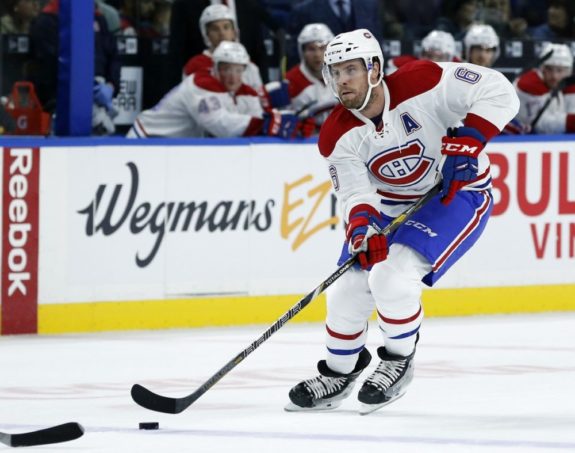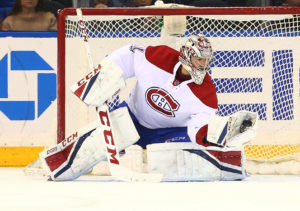The Montreal Canadiens clinched the NHL Eastern Conference’s Atlantic division, and as a “reward” they get to play the New York Rangers in the first round of the playoffs. The Canadiens were strong down the stretch, erasing a dismal 5-7-1 February record with a 12-5-1 finish.
The Canadiens will have home-ice advantage in the series. This could benefit the Rangers as much as anyone as they topped the NHL with 27 road wins. The Canadiens were 24-12-5 on the year at the Bell Centre, though, and swept the season series against the Rangers at 3-0-0.
The Rangers are more offensively productive at fourth overall in team goals for with 250, manufacturing 27 more goals than Montreal’s 15th-place total of 223. In five-on-five play specifically, it’s a little closer. The Canadiens moved up to 12th overall with 154 goals, just 11 shy of the Rangers’ 165 goals.
In general, Montreal is a feisty, balanced team. They only have two players in the top 135 in league scoring—Max Pacioretty (25th) and Alexander Radulov (69th)—but have four more players between 135th and 160th. They have an average but consistent power play, a stud shutdown defenseman in Shea Weber, and a top-notch goaltender. This should make for an entertaining matchup against a very similar Rangers squad.
Forward Lines

The Canadiens’ top unit consists of Philip Danault (jersey number 24), Alexander Radulov (47), and captain Max Pacioretty (67). This trio doesn’t produce as many points as other first lines, but they do wear down anyone who has to consistently play against them. This opens the game up for the other units. Having said that, all three of these players finished in the top six in team scoring, with Pacioretty and Radulov coming in first and second respectively. Pacioretty also ran away with the team goal-scoring lead with 35 goals, good for eighth overall in the league. Twenty-six of those goals came at even strength, tying him with the likes of Connor McDavid and Rangers counterpart Michael Grabner. While the offense doesn’t fall completely onto this line, it certainly doesn’t pass them by.
The second unit includes Brendan Gallagher (11), Tomas Plekanec (14), and Paul Byron (41). Gallagher is clearly the team’s spark plug. After missing some time with a hand injury earlier in the season, he’s back in form and looking to make a huge impact. He’s known for causing havoc in front of the net, and Henrik Lundqvist will have his hands full throughout the series. Plekanec is a useful faceoff man (51.2 percent faceoff win percentage). He’s also an effective two-way shutdown player, and this group has a combined plus-minus rating of plus-38. Byron was fourth on the team in points with 43, including six game-winning goals.

The third line features Alex Galchenyuk (27), Arturri Lehkonen (62), and Andrew Shaw (65). Galchenyuk finished third in team scoring with 44 points, and Shaw was a pleasantly surprising eighth (29 points). Lehkonen chimed in with 28 points, good for 10th. Unfortunately, Galchenyuk is also a team-worst minus-5. He’s had time on the first line and provides first-line production, but his irresponsibility at times has cost him some opportunities. Under new coach Claude Julien, he’s been much more consistent and should be rewarded with more meaningful minutes as the series progresses.
The fourth-line duties have been split between Torey Mitchell (17), Michael McCarron (34), and trade deadline acquisitions Steve Ott (29), Dwight King (21), and Andreas Martinsen (37). The Canadiens instantly changed identities on March 1, picking up some much-needed size. The best part is these players average close to or above 12 minutes of time on ice per game, which proves invaluable over the long playoff haul.
On Defense
With some relatively recent additions, the Canadiens now have what amounts to a plethora of capable defensemen. Several injuries have kept the pairings mixed up, and this has made it difficult for coach Julien to commit to a consistent fit. It’ll be interesting to see how he handles having them all available at once, but based on the most common pairings so far, here’s an educated prediction.

Quarterbacking the top pairing is Shea Weber (6), who may be partnered with Jeff Petry (26). Weber missed the last few regular season games with an injury but is expected back for Game 1. Weber is the calming effect the Canadiens’ back end desperately needs. He’s fifth on the team with 42 points and is a plus-20. He also has 22 power-play points. Petry has 28 points and averages over 22 minutes a game, proving he can handle first-pairing playoff minutes.
The second pairing may see Nikita Nesterov (89) reunited with fellow countryman Andrei Markov (79). Markov tallied 36 points in just 62 games, and is a plus-18. Nesterov joined the team in late January from Tampa Bay, but was injured on March 16 and only returned to the lineup within the past week.
Rounding out the top six is Jordie Benn (8) with Nathan Beaulieu (28). Benn has been a welcome relief on the penalty kill, taking some hard minutes away from the likes of Weber and Markov. He’s been injured as well, but should also be in the lineup for the series opener. The youngster Beaulieu has 12 power play points and is a plus-8.
These pairings are pending the status of big hitter Alexei Emelin, who missed the final two regular season games with an injury and will be reassessed prior to Game 1. Emelin has been everything this season from a top pair defenceman to a healthy scratch. If healthy, he will see action at some point in this series.
Another option is Brandon Davidson (88). He’s been a steady, physical defenceman since coming over from Edmonton just before the trade deadline.
In Goal

Obviously, Carey Price is the pillar upon which the Canadiens stand. He had 37 wins this season, good for the most wins by a goalie in the Atlantic division, and the fifth-most wins overall. Even with a midseason slump including giving up four goals or more in three straight games, he still acquired a .923 save percentage and a 2.23 goals-against average. He’s the kind of goalie who rarely fails to make the saves he’s supposed to, and can consistently make the extra saves he shouldn’t, which is bad for morale if you’re the Rangers.
Al Montoya is no slouch either, posting an 8-6-0-4 record on the strength of a 0.912 save percentage and a 2.67 goals against average, with two shutouts. That’s pretty good considering he had to shake off a 10-1 shelling at the hands of Columbus early in the year.
Special Teams
The Canadiens’ power play ranks 13th overall, just behind that of the 12th-place Rangers. Interestingly, Montreal’s power play ranks just 17th at home but is eighth on the road. The Rangers sit 11th in road penalty killing percentage but are a lowly 25th at home on the penalty kill. These numbers give the edge to the Canadiens.
On the penalty kill, the Canadiens are 14th overall, but have been particularly hot in the past two months. They were as low as 23rd overall in January. With more structure to their game, the kill has been more effective under Julien, which is a good thing because they’re 13th in total times shorthanded (the Rangers are 23rd).
Too Close to Call
These teams are very evenly matched and play a similar style, making this one of the most unpredictable series in recent memory.